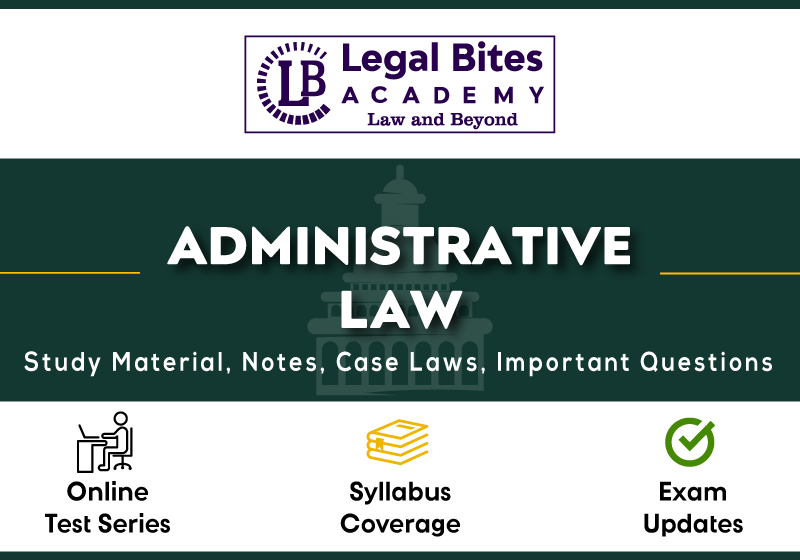Administrative Law - Notes, Case Laws And Study Material
Administrative Law emerged as a subject to curb the misuse of power by the executive.

Administrative Law emerged as a subject to curb the misuse of power by the executive. As the concept of separation of powers cannot always be followed, the powers have been distributed to reduce work overload. The objective is to ensure reasonable control over the powers in a fair manner. It can be connoted as Quasi-legislation or Quasi-judicial as it takes responsibility to act within its power as well as beyond the power to which it is vested.
A careful view of the remedies serves to help those affected by the administration and implement and enforce the law peacefully.
Legal Bites brings you a detailed study of Administrative Law. The five modules of our study material cover a variety of topics such as separation of powers, Dicey's concept of the rule of law, Administrative Tribunals and the Commission of Inquiry Act, 1952. We have also provided an additional section of miscellaneous articles to help readers understand every aspect of Administrative Law.
Important articles and study material on Administrative Law – Click on the links to Read:
Module I
- Introduction to Administrative Law
- Administration and Good Governance
- International Administrative Law- Origin, Elements and Features
- Rule of Law and Administrative Law
Module II: Basic Concepts – Rule of Law
- Dicey's Formulation Of Rule Of Law
- Fallacy Of Dicey's Aspect Of The Welfare State And Rule Of Law
- Rule Of Law In A Mixed Economy
- Formal and Ideological Concept of Rule Of Law
- Constitutional Provisions Embodying The Rule Of Law
Module III: Basic Concepts – Separation of Powers
- Doctrine Of Separation Of Powers As Propagated By Montesquieu
- Separation Of Powers Under Different Constitutions
- Judicial Pronouncements on the Doctrine of Separation of Powers
Module III: Rule-Making Power of the Administration
- Nature and Source of Administrative Rule-making Power
- Need, Permissible Limit and Classification of Administrative Rule-making Power
- Control Mechanism Of Administrative Rule-Making Power
Module IV: Administrative Tribunals
- Reasons for Growth of Administrative Tribunals
- Salient Features of Administrative Tribunals
- Advantages of Tribunals
- Structures, Powers And Procedure Of Administrative Tribunals
Module: V
- The Commission Of Inquiry Act, 1952: Object And Scope
- Ombudsman: Concept, Development and Working of the Institution
- Discretion to Disobey: The Jurisprudence of Departures from Rules
- Administration of Central Vigilance Commission (CVC): Critical Analysis
Other Important articles and study material on Administrative Law:
- Delegated Legislation
- Judicial Review of Administrative Action
- The Citizen and Administrative Faults
- Constitutional Protection to Civil Servants
- Practice and procedure of Administrative Adjudication: Rules of Natural Justice
- Liability of the Administration
- A Comparison Between Legislation and Precedent
- Doctrines of Administrative Law
- Public Interest Litigation
- Judicial Review of Administrative Action
- MAGNA CARTA
Your valuable feedback in the form of comments or any desired inputs are encouraged and always welcome.
Every contribution toward a goal is valuable, regardless of how small it may be.

